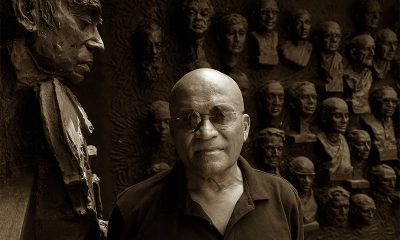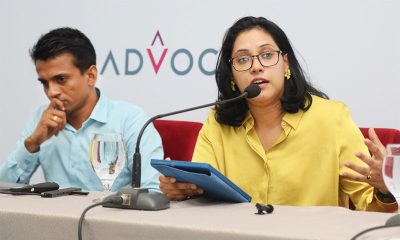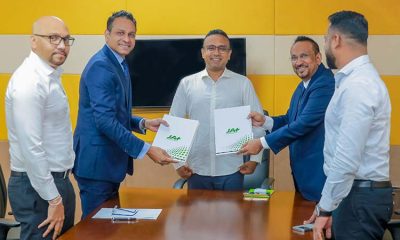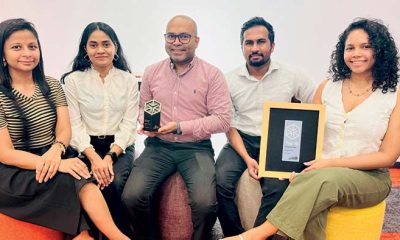Opinion
CEB shows total mismanagement

This is in relation to the article by Dr. Chandre Dharmawardana, “Sri Lanka’s power supply, blackouts, and how to prevent them” published in the Island Newspaper.
I am an electrical engineer, who has spent the last 30 years in research and development in telecommunication systems and system reliability, which includes software reliability. Today, as a consultant, I am guiding the engineers and scientists of the Canadian Utilities in trying to understand a previously unknown condition affecting the grid networks. Canadian utility networks are highly sophisticated, complex networks, protected by many strategic and tactical networking designs, to account for not only the inevitable faults, but also the ability to withstand weather from -50C to +50 C, including rain, ice and snow storms.
Over the last five to six years, the utilities have found the prevalence of large magnitude, 7th and 9th harmonics, which has been contributing to several unforseen outages in the Canadian networks. This phenomenon has been observed in Europe and in the USA. The grid is primarily designed for large 3rd harmonic fault tolerance. Experiments and tests over the last five years seem to suggest that the switching power supplies, wind and solar power generation equipment, and the large plethora of small mobile telephone and laptop charging equipment might be the source of these large magnitude harmonics. Yet proper fault diagnosis and containment had prevented outright failures, even in the presence of fault conditions previously not encountered or understood. That is good system effectiveness.
The point however, is that rapid problem sectionalization, fault containment (from rapid fault propagation), rapid problem restoration and preventive maintenance are at the heart of designing and maintaining mission critical systems, such as the utility network in Sri Lanka. The system complexity is needed in order to ensure rapid problem sectionalization and containment. As Dr. Dharmawardana suggests, it is inconceivable that the actions of an individual of the CEB is to be blamed for the catastrophic outages the country had experienced. The competency of the individual engineers at the CEB must be just as good as the competency of the medical, public health, the military and the police personnel, who were primarily responsible for containing and controlling the transmission of the Covid virus in Sri Lanka; comparatively better way than most other countries in the world. Having worked in the UK, Canada and in Europe, it is my informed opinion that the engineers at the CEB are no less competent than any other engineer in the world.
Hence, the engineers in Sri Lanka must be competent in performing Failure Mode Criticality Analysis (FMECA) in the mission critical systems such as the electricity grid network. It is so fundamental, that any graduate engineer is taught that in mission critical systems, one must account for all faults down to at least the third degree of failures, and design the system to be fault tolerant to that level. There are no such systems as ‘fail safe’ systems; failures are a part of any complex system, which includes all human induced failures.
The system should be designed to be robust enough to withstand at least three levels of faults before catastrophic failures precipitate. Telephonic systems are designed for no more than one catastrophic failure in 60 years. However, if the operators have no discipline, and are so incompetent, that they allow the faults to propagate to the second, third and the fourth levels, without containment, the catastrophic outages are inevitable. It is really “stupid’ to suggest that just one operator pulling one circuit breaker brought down the entire network. This is inconceivable in a mission critical system. As we have seen, Boeing and the FCC, not performing the FMECA diligently and independently, partly accounted for the recent fatal aircraft accidents. Testing software systems against requirements, either specified, or deduced from FMECA, is an absolute necessity in mission critical systems. In order to effect cost savings, sometimes the systems are only tested against the specified requirements, and not against the deduced requirements from failure analysis. This is not the norm, but it happens elsewhere in the world.
In the case of the CEB, the only conceivable possibility is total mismanagement. Lack of effective preventive maintenance, systemic or rampant organization issues that prevent the effective utilization of the collective knowledge base that exists within the CEB; these are refactors at the heart of these outages. As a trained engineer, it is my opinion that it is the lack of process and operational integrity that caused the outages. These elemental issues must be addressed as a matter of priority, in order to eliminate such outages in the future. No amount of artificial intelligence and smart system designs can eliminate the need for effective and smart operational practices.
LAYANANDA ALLES, Eng.Montreal, Canada
Opinion
Observations on Electricity Bill
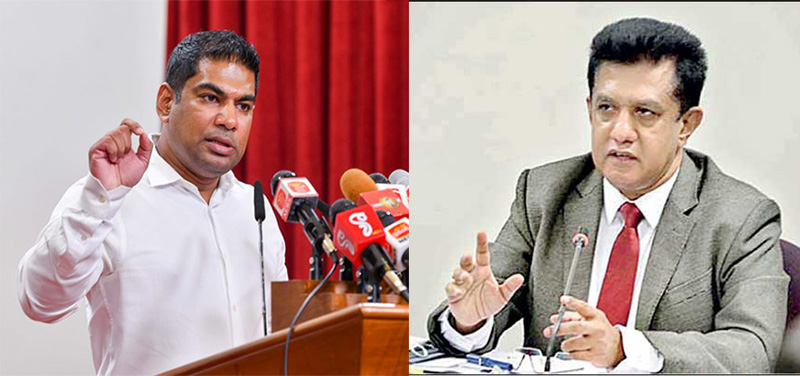
Prof. Charitha Herath’s letter to Minister of Power and Energy Kanchana Wijesekera
Having reviewed the recently published Sri Lanka Electricity Bill in the gazette, I wish to express my appreciation for the improvements made compared to previous drafts. It’s evident that considerable effort has been invested in refining this version of the bill, making it notably more comprehensive and effective.
Nevertheless, I have identified some fundamental issues in this draft as well. I believe that the forthcoming discussions on this draft will provide an opportunity to address these concerns. Given that the drafting committee appears to have finalized their positions on the matter, I suggest that the proposed changes to the bill should be subjected to scrutiny first in the Supreme Court and subsequently in the Parliament. I anticipate that certain comments and issues regarding the bill will be raised during the legal submission to the courts and in the policymaking exercise within the Parliament.
In the meantime, I wanted to share some of the issues I’ve noticed at the forefront of the bill with you. I believe your consideration, as the incumbent Minister of Power and Energy, is crucial regarding these matters. Thus, I aim to bring these issues into the national discussion surrounding this significant legislative process.
Reforms are Needed
As many would concur, I share the belief that reforms in the Power and Energy sector are paramount. This necessity has been a focal point in policy-level discussions over the past two decades. The current regulations governing the Power Sector, established under the Ceylon Electricity Board Act No. 17 of 1969 and the Electricity Act No. 20 of 2009, have highlighted numerous lapses and legal complexities. These issues have resulted in delays and, in some cases, hindered the development within the sector.
In my view, the reform requirement mentioned above was not adequately addressed by the gazetted bill on 17/4/2024. Instead, it appears to provide excessive leeway for political actors to intervene in the regulatory mechanism of the Power sector. In essence, the proposed bill could exacerbate existing difficulties in certain areas and potentially delegate decision-making power entirely to political entities.
When examining international experiences, Power sector reforms typically unfold in three stages:
1. Unbundling and corporatization, often adopting a single buyer model.
2. Establishment of a wholesale market.
3. Establishment of a retail market.
These stages represent a structured approach to reform aimed at enhancing efficiency and promoting competition within the sector.
The overarching goal of reform experiences is to transform initially highly regulated existing markets, where the regulator decides on allowed Revenue and Returns of Investment (ROI) except Power Purchasing Agreements (PPAs). Consequently, reforms typically advance towards deregulation, wherein prices are determined through competition. This progression aims to foster greater market efficiency and encourage innovation within the sector.
The gazetted Bill, dated 18/04/2024, outlines an initial proposal for unbundling and corporatization, operating within a single buyer model. Under this framework, the National System Operator (NSO) is tasked with purchasing electricity from Generation Companies (Gencos) and subsequently selling it to Distribution Companies (Discos). Additionally, the bill aims to establish a wholesale market model, wherein prices are determined through competition between Gencos and Discos. This approach signifies a pivotal step towards fostering market efficiency and promoting competition within the sector.
Given that approximately 85% of the cost of electricity in Sri Lanka is attributed to generation, it is imperative to prioritize the establishment of competition within the generation sector. Therefore, in alignment with the overarching reform expectations, it is crucial to thoroughly examine the gazetted bill. This careful scrutiny will ensure that the proposed reforms effectively address the need for competition in the generation sector, ultimately contributing to greater efficiency and affordability in the electricity market.
Some Observations
·
In order to effectively implement new reforms in the Power sector, there are two crucial aspects to consider at a conceptual level. Firstly, it is imperative to consult and involve the main stakeholders of the industry in the proposed legal and institutional reforms. It is essential to ensure that their voices are heard and that they are actively engaged in the process, regardless of whether all stakeholders are in agreement with the Bill. Secondly, it is vital to ensure that the proposed reforms adequately address the core issues at hand. Unfortunately, it is my belief that the Government has failed to address both of these highly important issues.
· The proposed bill signifies a notable shift towards increased Politicization of the Electricity Sector. It is clear that key institutions to be established under this bill will be subject to substantial political influence. For example, following the bill’s passage, entities like the Long Term Generation Expansion Plan (LTGEP), National System Operator (NSO), Power Sector Reform Secretariat (PSRS), and certain functions of the Public Utilities Commission of Sri Lanka (PUCSL) will come under direct political control.
· The independence of successor companies and corporate good governance will no longer be maintained, as management control will now rest with the Minister in Charge.
· The Electricity Reform Act no 28 of 2002(that was not implemented due to political reasons)had proposed the establishment of an independent agency known as the “Monitoring and Advisory Committee” to spearhead the reform project. This committee was intended to have the authority to advise the Minister on the appointment and dismissal of directors of the proposed successor companies. However, the recently gazetted new Bill (17/04/2024) does not include this independent mechanism, giving the Minister the power to appoint the Board of Directors of the successor companies. Furthermore, the Minister’s consent is now required for the appointment of the CEO of NSO, as outlined in Section 10 (1)(b) & (c) of the new Bill.
· The “Long Term Power System Development Plan” is formulated by NSO and then forwarded to the Minister for assessment, followed by submission to the Cabinet for approval (as outlined in the recently gazetted Bill, Section 10 (7) (b)).
· Weakening of the Regulator, PUCSL
· The PUCSL no longer holds the power to approve the “Long Term Power System Development Plan” as it has been transferred to the cabinet of Ministers, as per the newly gazetted Bill, Section 10 (7) (b).
· According to Section 3(1)(a) of the Sri Lanka Electricity Act 2009, the PUCSL has the authority to provide advice to the government on matters within their jurisdiction. Nevertheless, the recently gazetted Bill has revoked these powers and transferred them to the National Electricity Advisory Council, which will be appointed by the Minister (new Bill, Section 3 (3)).
· According to Section 20 (2) of the Bill that was gazetted in December 2023, the Regulator is required to simply “inform the Minister” when granting licenses for generation, transmission, and distribution. However, in the recently gazetted Bill, the Regulator now needs to seek the “concurrence of the Minister” before granting licenses.
· The Bill’s Section 4 (10) includes provisions that enable the bypassing of competitive tendering through the provision of incentives to select technologies.
· Illogical Timeline – proposed approach to rescind the current Acts in 6 months without any preconditions, unveiling the Transfer Plan after the specified date, and more.
· As per the new Act, the functions currently executed by CEB will be transferred to the newly formed successor companies within a maximum duration of six months. Section 1 (2) of the Act ensures automatic appointment within this timeframe.
· The process of setting up new successor companies includes drafting detailed Memorandums and Articles of Associations, reallocating assets, liabilities, and human resources, preparing new balance sheets, creating financial models for tariff development, and finalizing the incorporation of other supporting functions. The unrealistic timeline proposed in this new Act is a significant issue.
·It’s not just the impracticality, the legality of forming companies according to a transfer plan which has not been approved and gazetted is also another serious issue.
·Electricity Pricing – guaranteeing fair returns, measures to establish private monopolies, minister directs policy guidelines to encourage specific projects/technologies, no safeguards for regional trade below domestic market prices, permitting current generation licensees to engage with distribution licensees before entering the Wholesale market.
· The increase in electricity prices is tied to the requirement for a justifiable return on investment as outlined in the recently published Bill, Section 29 (5) and (9)(a). This will cause prices to rise, with the Regulator being legally required to ensure that profits are kept at a reasonable level. In times of high inflation or interest rates, electricity prices may see an uptick. The assurance of a reasonable ROI can be accomplished through tariff policies, which are not legally mandated, giving the Regulator the ability to lower profits during tough economic times.
·Granting free access and allowing Captive Generation without comprehensive study as stipulated under Section 12 could lead to the general public being unable to access cost-effective power plants, ultimately causing prices to escalate.
· Section 30(4) permits distribution licensees to engage in power purchase agreements with generation licensees before the Wholesale Electricity Market is established. The competition between distribution licensees for access to inexpensive power plants will drive up prices.
· In the December 2023 gazetted Bill, there was a provision that prohibited the acquisition of combinations of licenses without any qualifications (Section 19 (6)). However, in the new Bill, this prohibition only applies if a company owns more than 50% of the ownership. For instance, if a company owns 49% of the National Network service provider, it can still acquire a Distribution license and shares of multiple other companies as long as its ownership remains below 50%. Additionally, with the introduction of Additional Transmission Licenses, it is possible for a few companies to have control over more than 50% of the National Grid.
· Private companies have been granted Additional Transmission Licences under the new Bill, as stated in Section 14 (2). Nevertheless, Section 10 does not grant the NSO the authority to utilize transmission lines owned by these Additional Transmission Licensees in order to ensure a consistent electricity supply.
· The new Act does not include any provisions to address monopolies, anti-competitive practices, collusion, abuses of dominant position, and merger situations that could impact competition in the Electricity Industry. Rather than enacting specific laws to combat these issues, Section 28 grants the Minister the authority to issue policy guidelines.
· Additionally, as per Section 10(13)(b), it is stipulated that the terms of Electricity trading with foreign nations must receive approval from the Cabinet of Ministers. Given that this trading has a direct impact on the sovereignty of the nation, these terms should be ratified by Parliament, especially for fundamental conditions.
· The exportation of low-cost renewable energy to other countries may result in the deprivation of citizens from accessing affordable electricity. Regional trading lacks protection against prices below the local market costs.
As mentioned earlier, stakeholders and policymakers will have limited avenues for correcting the draft bill once it has been gazetted and tabled in parliament. One option is to seek determinations from the Supreme Court, while the other is to propose amendments during the Committee Stage of the parliamentary debate. However, given the current government’s approach to passing acts in parliament, there are doubts about the feasibility of making amendments through the parliamentary process. The considerable majority power of SLPP MPs is likely to heavily influence and potentially override discussions on the issue within parliament.
I urge the Honourable Minister to carefully consider the observations outlined above and take necessary steps to amend the bill accordingly from the government side. Furthermore, I strongly encourage the Honourable Minister to convey these observations to your advisory council for their expert input and recommendations in rectifying the identified issues. This proactive approach will ensure that the bill is revised comprehensively to address concerns and uphold the principles of fairness and effectiveness in the reform process.
Lastly, I would like to reference an important excerpt from Sally Hunt’s influential book, “Making Competition Work” (2002), which directly relates to the subject under discussion here: “In the US energy industry, it is fairly clear that the major problems with the old structure lay in the generation part of the industry – the efficiency of the investment decision, its regulation, and the tendency for decisions on generation to become politicised” (p. 28).
What I have observed throughout the process of drafting the new Electricity Act is a concerning trend towards politicization of decisions regarding generation. I strongly urge you to take decisive steps to halt this trend and address the issues present in the bill accordingly. It is imperative that we uphold the integrity of the legislative process and prioritize the best interests of the public and the energy sector as a whole.
Charitha Herath (MP)
Opinion
My aviation mystery
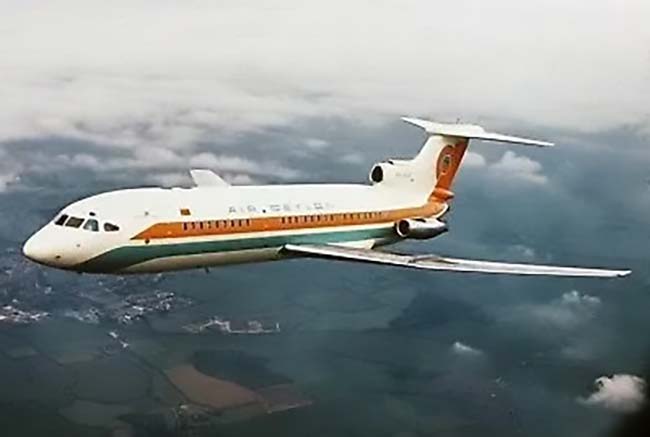
By Dr Upul Wijayawardhana
Before I get to the worst experience in my air travels, I need to mention that much has happened since I wrote “Biggest mysteries in aviation history” (The Island, 22 March) which concluded with the following:
“Ten million passengers take to air each day and air travel has become the safest mode of transport but some recent incidents involving Boeing have made dents in public confidence as some are accusing Boeing of putting profits before safety. Hope it is not true!”
Based on this comment, Guwan Seeya had written an excellent piece “Truth about air safety” (The Island, 8 April) which was very revealing and concerning, as he ends his piece with: “Yes, it is a mercenary world and we are all walking on thin ice.” Considering the detailed analysis, it is pretty obvious that Guwan Seeya is an experienced pilot, most likely retired as he calls himself Seeya, who is an air-crash investigator and what he states should be taken very seriously. May I thank him wholeheartedly for the excellent information which has further evinced my interest in aviation safety.
In the practice of my profession, medicine, very quick decisions have to be made, just like in aviation, and sometimes we get things wrong. In UK, we do regular audits and review deaths so that we may improve practice by learning lessons from mistakes and have always looked up to air-crash investigations as the model to follow but even that can be improved, as pointed out by Guwan Seeya. He faults the US Federal Aviation administration (FAA) for being reactive than proactive, the most telling line in his piece being “Pilots always say there has to be blood on the runway for changes to happen!”
Boeing, once a byword for safety, has lately suffered from safety issues as it seems to have put profits first, as alluded to in my piece. It has had a downhill course since the merger in 1997 with McDonnel Douglas, ill-advised according to critics, culminating in 737Max disasters. Attempts were made to blame the pilots for the problems with the ‘Manoeuvring Characteristics Augmentation System’ resulting in the fatal crashes of Indonesia’s Lion Air and Ethiopian Airlines but Boeing had to finally admit responsibility.
Not putting bolts in a door plug, making it fly away from an Alaskan Airlines 737Max flight, however, was the turning point leading to two inquiries by the US senate where devastating evidence had been given by whistleblowers. More worryingly, one of them died of gun-shot injuries; supposed to be a suicide but some doubt whether it is so! Most of the top executives have been sacked or decided to step down and do hope a safer era of aviation would dawn. Till then, some concerned passengers may decide to opt for Airbus flights. There is some hope for SriLankan Airlines!
I have enjoyed flying and the only regret in my life is not being able to get time-off from my professional duties to obtain a private pilot’s licence. Even the warnings from Guwan Seeya is unlikely to put me off from flying! My first long-haul flight to London in 1969 was on a Vicker’s VC10, leased to Air Ceylon from BOAC and well remember rehearsing for it by taking a Colombo/Trincomalee flight, paying for it by using the first-class railway warrant!
Since then, I have been fortunate to fly all over the world on many airlines, some now extinct, meeting every eventuality except an air-crash or hijack. Our flag carrier was Air Ceylon from 1947 to 1978 and it had the distinction of never having had a major disaster. Air Lanka, which took over from Air Ceylon in September 1979 was not so lucky, one of its’ Lockheed Tristar’s being blown to two pieces by a Tiger bomb on 3rd May 1986 in BIA.
The bomb planted in the cargo hold was meant to detonate mid-air but it was fortunate that the flight was delayed resulting in the loss of only 14 lives. It was re-branded in 1998 as SriLankan Airlines and a pre-dawn raid by Tigers on 24th July 2001 resulted in the total loss of two Airbus A330 and one each of A340 and A320 aircraft.
“Ladies and gentlemen! This is the captain speaking. I am sorry to inform you that we have to make an unscheduled diversion to Bombay airport” I was woken up from a slumber by this unexpected announcement in the Air Lanka Tristar night flight headed to Dubai. I cannot remember the exact date but it was late 1986 and I was on my way to London, accompanying my good friend Dr Nihal Perera for cardiac investigations with a view to surgery. Though I am usually awake when I accompany a patient, I dozed -off after the heavy meal as Nihal’s wife Rani, who was seated just behind us, told me she would wake me up if there was any problem.
As I was a frequent traveller, many of the staff knew me and I had the occasional privilege of sitting in the cockpit too, being in the times before restrictions were introduced. I quietly approached the chief purser who confided in me that the diversion was due to a bomb-threat. When we landed in Bombay airport, I noticed the entire surroundings of the runway cleared and our flight was directed to a corner where a number of ambulances and fire-trucks were awaiting our arrival, with flashing lights! It was only then I told Nihal, whom we affectionately referred to as Seba, what the problem was and whispered “Seba, we can not wait for a wheel chair in the face of this threat. Shall we walk slowly to the terminal?” Fearing for dear life, he agreed and we hurried up with no problems, fortunately.
We were in Bombay for almost twelve hours, emplaning and getting out, at least five times as there were a number of minor irregularities. Different authorities involved made repeated checks and no bomb was found. Waiting in the then primitive Bombay airport and the apprehension was intolerable, to say the least, but were relieved when the captain made an announcement on the sixth occasion we emplaned “Ladies and Gentleman, Extremely sorry for the delay and we will be leaving shortly though the officials now say that they have overlooked searching the perishable cargo. I have decided to dump the perishable cargo, though it is worth about 15,000 British Pounds, as I do not want to inconvenience you any longer”. Deservedly, he got a thundering applause. It is so bad of me not to remember the name of that captain!
We arrived in London, exhausted and 12 hours late but Nihal was able to have tests a day later and successful surgery thereafter. He survived not only a heart attack but also this ordeal to become the President of SLMA in 1988.
Obviously, this was a hoax telephone call and extremely unlikely Tigers were behind as they mean business. I searched the website of the Department of Civil Aviation and this incident is not recorded, at all! I wonder whether Air Lanka investigated the source of the call.
This was the time GMOA was agitating for a division of the Cardiology Unit and hurling mud at me, every turn. Just imagine if Nihal got adversely affected by this hoax. My reputation would be in tatters!
What is intriguing was a news item I spotted on the front page of the early edition of the Daily News, handed to us by the cabin crew, as we sat down after emplaning in BIA. It was titled “Dr Upul Wijayawardhana off to London” and continued to say that I was accompanying Dr Nihal Perera for treatment. When I showed this to Nihal and Rani, they were as surprised as I was as neither I, nor them, had informed anyone of the visit, let alone the press! Anyway, is it newsworthy? Why was Nihal’s privacy not respected? Who gave the information and was the hoax call connected?
I can only guess but mystery remains!
Opinion
An exemplary officer of the Colombo Municipal Council

We all die one day and for those of us living within the municipality of Colombo, the chances are that we will be cremated or buried in the main cemetery of Colombo, the Borella Kanatte cemetery.
This famous institution is headed by a cemetery manager and a host of workers who are by the very nature of their work an essential part of the functioning of the city of Colombo. Every city has to dispose of their dead citizens in a respectable and dignified manner and the Kanatte institution is therefore an important part of the “life” of the city.
The cemetery manager who is directly under the Chief Medical Officer of the Colombo Municipality has a role to play with all the relatives and dear ones of deceased persons, and can make a funeral a “pleasant” or an unbearable experience. He is the one together with the funeral undertaker who makes the funeral function normally.
The case I am writing about is my and my family’s interaction with the manager, a new one, in a somewhat complicated procedure we as a family had to undergo, as this had to do with an exhumation, a cremation and a deposition of ashes.
Our eldest son died on May 8, 2018 in Buttala, under unknown circumstances after a lunch meal with a friend from Sweden who was visiting him.
Our son who was a bachelor lived alone on his own land in Buttala together with a caretaker and his family who looked after the agricultural side when he was not in Buttala.
We, his father and mother had journeyed to Sweden and had been there only for four days when we were informed of his untimely death. We then, together with his younger brother who lived in London, journeyed back to Sri Lanka in order to take care of this very sad event.
Since the postmortem could not definitely identify what had caused his death except for some extraneous substances found in his stomach, the coroner ruled that he should be buried at least for three years, and if necessary cremated thereafter giving time for any unexpected findings in a legal context in the meantime.
Our son whose body was brought to Colombo was then duly buried in the Anglican section of the Kanatte Cemetery on May 12, 2018 in a temporary grave.
Three years passed and in 2021 during the pandemic we took up the case for an exhumation and cremation and deposition of his ashes in our family grave in the Buddhist section of the cemetery. This involved a legal procedure in the Courts of Colombo which was done by a firm of lawyers to get official permission for the exhumation etc and also entailed the help of the Municipalty, their Chief Medical Officer and not least the Cemetery Manager of Kanatte.
This procedure in the Courts of Colombo sadly took three long years and we were given permission for the exhumation etc. I believe in October 2023.
Once the court order was ready we went with it to the Manager of the Cemetery where we were received with the utmost decorum and friendliness.
We were then told what to do, which included a funeral undertaker´s involvement in the transport of the remains to the crematorium etc. and their subsequent help in the collection of the ashes and finally the deposition in our family grave.
All this work was very smoothly done and thanks to a concerned and adept municipal officer, Mr. Herantha Jayawardane the Manager of the Kanatte Cemetery. All this work was done in just two days- the exhumation-the cremation- the collection of ashes and the deposition in our family grave.
I am glad that such officers are a part of our Municipality. Thank you Sir for all your help.
Vera Gamini Samarasinghe
-

 Business3 days ago
Business3 days agoCEAT Kelani launches three new radial tyre variants in ‘Orion Brawo’ range
-

 Midweek Review7 days ago
Midweek Review7 days agoBetween abstraction and empathy in Sarath Chandrajeewa’s visual paraphrases
-

 Business7 days ago
Business7 days agoSOEs seen as failing SL’s ordinary citizens
-

 Business5 days ago
Business5 days agoDialog-Airtel Lanka merger comes centre stage
-

 Business7 days ago
Business7 days agoSri Lanka Tourism concludes another round of Roadshows in Australia
-

 Business5 days ago
Business5 days agoSLFEA appoints JAT as a Facilitation Partner for training painters to provide overseas employment opportunities
-

 Business2 days ago
Business2 days agoCeyline Travels and MBA Alumni Association of University of Colombo sign MOU
-

 Business3 days ago
Business3 days agoHayleys Fabric celebrates triple triumph at ISPO Textrends Spring/Summer 2026














